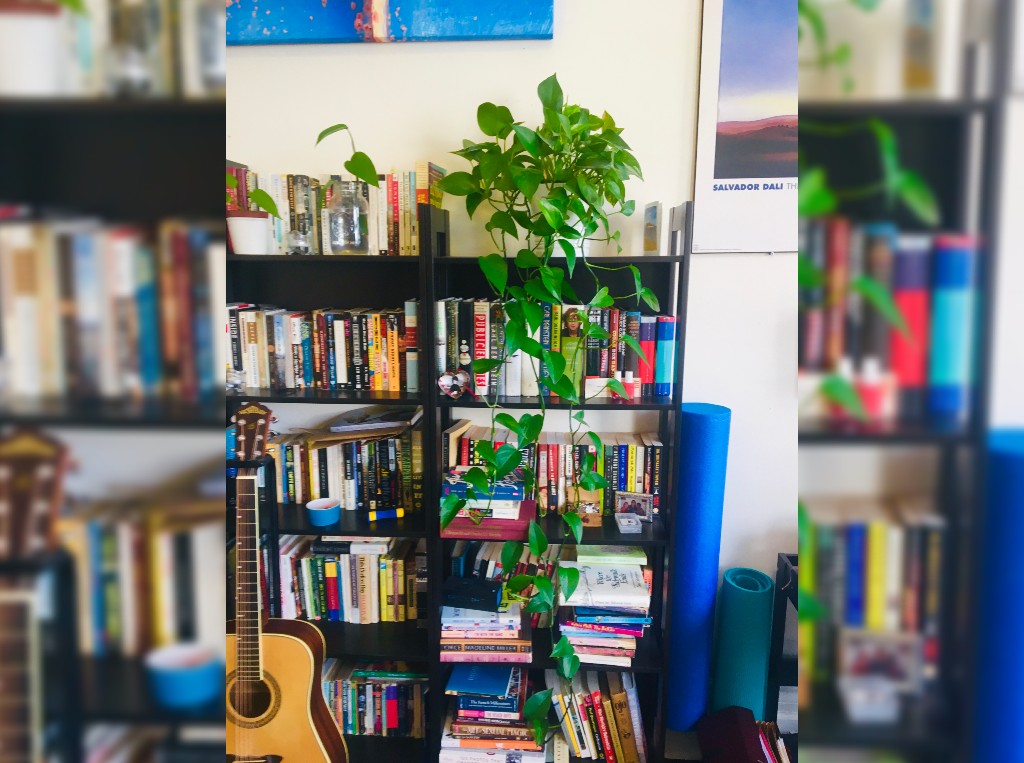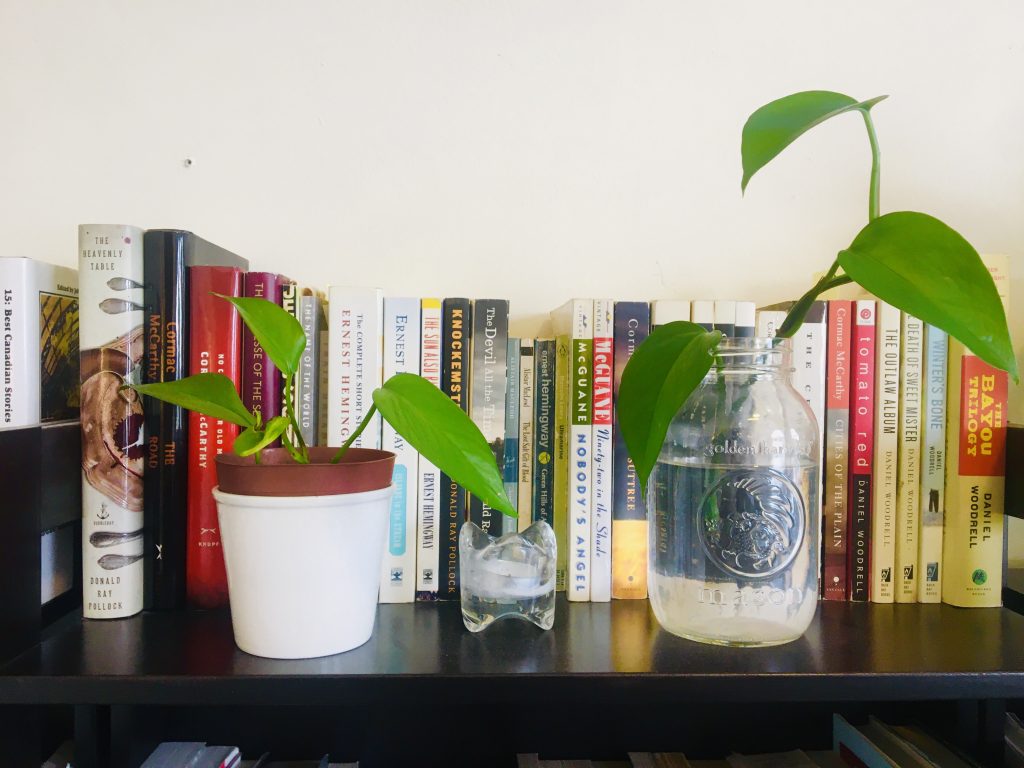Jenna Illies lives in the Annex, a Toronto neighbourhood dotted with parkettes and flanked by large parks where residents flock in warmer months.

But since the new coronavirus forced Canadians indoors, going for walks has somewhat lost its charm. That’s why Illies turned to gardening.
READ MORE: ‘I just want to survive’ — Canadian greenhouses struggling with economic reality of COVID-19
Without gardening, Illies would have very little interaction with the outdoors — something she suspects would significantly impair her mental health.
“I’ve never had the opportunity to be a big gardener, but it’s always interested me,” she said.
“Since the pandemic started, I’ve made two cuttings from my huge pothos plant … and now they’re my plant babies.”
Illies is also grateful that, last fall, she decided plant tulip bulbs in her small front yard.
“Though many bulbs were stolen by squirrels, there are about 11 set to bloom and I can hardly wait,” she said.
“It’s really given me something to look forward to during a time when my anxiety is off the charts and daily life feels so monotonous.”
Everything Illies loves about gardening is exactly why registered psychologist Christine Korol recommends it to her patients as a mood-boosting activity — especially right now when many are isolated from others due to the pandemic.
“Gardening is a great physical activity that we can safely do outside, so it checks a lot of boxes in terms of an activity that will improve your mood,” Korol told Global News.
“It also gives you a sense of accomplishment, which is connected to improving your mood.”

There’s ample evidence of the correlation between gardening and positive health outcomes.

Get breaking National news
A 2017 study found that gardening contributed to reductions in depression and anxiety symptoms, stress, mood disturbance and body mass index (BMI). It was also proven to increase quality of life, sense of community, physical activity levels and cognitive function.
Surrey, B.C., resident Andy Baryer has always loved gardening, but the hobby has become that much more important since the pandemic began.
READ MORE: Edmonton greenhouse sees spike in green thumbs amid COVID-19 pandemic
“In this time of isolation, gardening has been especially important because it has drastically improved my mental health and overall well-being.”
Baryer works as a freelance technology journalist, and when the pandemic forced him to stay inside, he says he felt his mental health and productivity begin to suffer.
“In the garden, for a brief moment, I forget about the pandemic.”
It also allows him to reconnect with nature — something he hopes other Canadians are able to think about on Earth Day during this unprecedented time of isolation and reflection.
“If we’re forced to stay home, it seems fitting to bring nature inside,” he said. “Having plants and flowers in my living space reminds me that there are things we can control in our lives.”

It doesn’t matter if you have a sprawling outdoor garden or a few flower pots in your living room. According to registered psychologist Melanie Badali, any kind of gardening is a powerful tool for practising mindfulness.
“When we garden mindfully, we practise focusing on what we’re doing (for example, ‘I am digging in the dirt’) and being where we are (for example, ‘I am standing on the earth’),” Badali said.
“If we can focus on the garden, it can be a break from negative emotions that can arise from harshly judging ourselves or other people.”
READ MORE: ‘Garbage gardening’ — How to turn kitchen scraps into plants
It’s no surprise that physical distancing and self-isolation measures related to the new coronavirus have severely affected the mental health of Canadians.
People have been forced to spend time alone for the last few weeks, and the news has been consistently filled with discouraging data about the virus. For those who live with anxiety, depression and other mental health issues, this can be a recipe for disaster.
“Right now, many of our minds are busy travelling to the future and spending a lot of time worrying about ‘what if?'” Badali said.
“Taking time to breathe and connect with nature doesn’t solve all our problems, but it can be a helpful, recharging break.”

A garden is whatever you make of it, said Badali.
Below are some tips for starting your garden this spring.
‘Garbage gardening’
Repurposing old food scraps can be a sustainable way to start a garden — especially during the pandemic, which might limit your access to seeds and other gardening tools.
Chickpeas, for instance, can be coaxed to flower in hanging baskets, and beets can be transformed into showy dish gardens with their colourful purple and green foliage surrounding contrasting blooms.
READ MORE: Gardening trends 2020 — Landscaping for disasters and unusual succulents
Start new plants on the windowsill by using the byproducts from roots, nuts, tubers, beans, bulbs, seeds or cuttings — the “garbage,” if you will.
Water, pebbles, soil or peat can be used as a growing medium.
Balcony gardens
You don’t need a sprawling backyard to build a successful garden.
Basically, anything you can grow in the ground can be grown on a balcony, certified horticulturalist Dave Attard previously told Global News — except for items like carrots and potatoes, which require deep growing bases.
Veggies like zucchini and eggplant are fairly low-maintenance, as are herbs like dill and mint.

“You just have to be aware of your light requirements and make sure that you’re putting the right plant in the right space,” he said.
If your space is shady, avoid tomatoes and peppers and opt for leafy greens instead.
Potting mix is ideal for balcony gardening because it’s mixed with peat and perlite to hold moisture and allow air to flow through your plants in an enclosed container.
Questions about COVID-19? Here are some things you need to know:
Health officials caution against all international travel. Returning travellers are legally obligated to self-isolate for 14 days, beginning March 26, in case they develop symptoms and to prevent spreading the virus to others. Some provinces and territories have also implemented additional recommendations or enforcement measures to ensure those returning to the area self-isolate.
Symptoms can include fever, cough and difficulty breathing — very similar to a cold or flu. Some people can develop a more severe illness. People most at risk of this include older adults and people with severe chronic medical conditions like heart, lung or kidney disease. If you develop symptoms, contact public health authorities.
To prevent the virus from spreading, experts recommend frequent handwashing and coughing into your sleeve. They also recommend minimizing contact with others, staying home as much as possible and maintaining a distance of two metres from other people if you go out.
For full COVID-19 coverage from Global News, click here.
— With files from the Associated Press and Global News’ Arti Patel
Meghan.Collie@globalnews.ca











Comments
Want to discuss? Please read our Commenting Policy first.